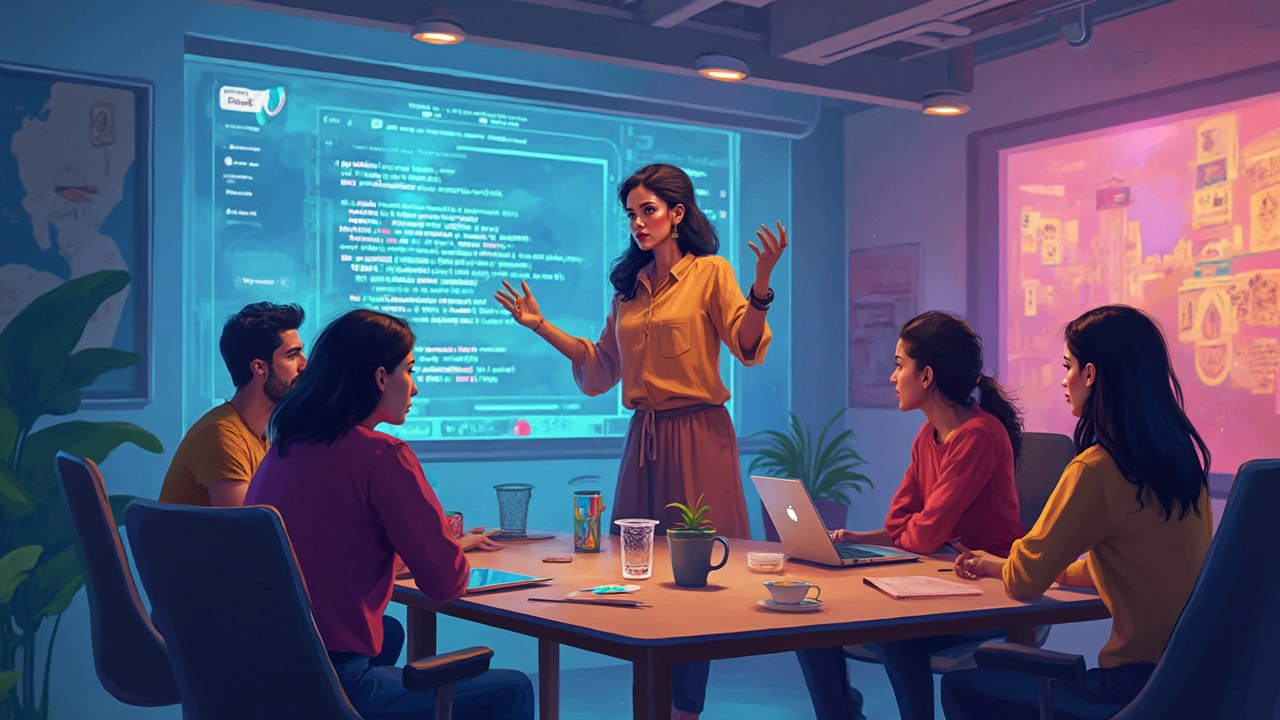Forget what you've heard about tech being a young person’s game. People over 50 are jumping into coding and making it work—and not just for fun, but for real paychecks. Python is actually one of the friendliest programming languages out there. It’s so readable that even complete beginners pick it up faster than most expect.
Here’s the thing nobody says loud enough: companies care more about what you can do than when you were born. There are thousands of job listings for Python developers right now, covering everything from web apps to data analysis, and most don’t care about age as long as you can show you know your stuff. Yes, some fields are extra competitive, but roles in healthcare tech, local businesses, and fintech are hungry for people with practical coding skills, no matter their age.
So if you’re considering a career switch or just want new skills, you’re in a great spot. A lot of coding bootcamps, online courses, and local meetups are filled with students over 40 and 50. Tons of free and cheap resources exist, and you’ll even find groups built specifically for older beginners. Python’s flexibility means you can build anything from small automations to advanced web apps, which makes it a strong bet if you want to stand out.
- Busting the Age Myth in Tech
- Getting Started with Python When You're 50+
- How to Prove Your Skills to Employers
- Keys to Standing Out and Landing That Job
Busting the Age Myth in Tech
It’s pretty common to hear that tech is “a young person’s world,” but the data keeps proving that wrong. Age isn’t a deal-breaker—skills, attitude, and the willingness to learn new things matter way more. Just check out these facts: in 2023, CompTIA found that nearly 27% of U.S. tech workers were over 45, and about 12% were 55 or older. The industry’s changing fast, and companies know that folks with real-life experience can bring unique value.
Plenty of big tech names—like Satya Nadella (Microsoft’s CEO since age 47) and Stewart Butterfield (started Slack at 41)—show it’s never too late to have an impact. Even outside management, hiring managers are getting used to non-traditional hires who can show what they can actually do, not just their birth year.
Age discrimination can happen, but it’s rarely as simple as being “too old.” Most employers care about:
- How well you adapt to new tools
- Your actual coding/project skills
- Whether you solve problems and get along with others
Plenty of companies have started putting a focus on diversity, including age. Multi-generational teams can be stronger because you get different perspectives and more practical problem-solving.
| Age Group | Percent of Workforce |
|---|---|
| 18-24 | 9% |
| 25-34 | 28% |
| 35-44 | 27% |
| 45-54 | 24% |
| 55+ | 12% |
It’s easy to get discouraged by old stereotypes, but the numbers say something else entirely. Learning Python and picking up new tech skills at 50 or beyond means you can still absolutely land a solid role—maybe even one that mixes your old career experience with your new programming chops.
Getting Started with Python When You're 50+
Jumping into Python at 50 isn’t as wild as it sounds—it’s actually super practical. Python’s clean style and massive community mean there’s always someone out there who’s already solved your problem, or who’s happy to help. In fact, a 2023 Stack Overflow survey showed that 42% of people who started learning to code in the last five years were over 35. You’re definitely not alone in this boat.
Getting started feels less scary if you break it into clear steps:
- Pick one resource and stick to it, at least at first. Some popular beginner-friendly options are Coursera’s Python for Everybody, freeCodeCamp, or even YouTube crash courses. Avoid bouncing around—it’s all about tiny wins.
- Install Python on your computer. The official site (python.org) has downloads for Windows, Mac, and Linux. If that sounds confusing, look up a two-minute install video—there’s plenty.
- Write your first tiny program. Everyone starts with “Hello, World!” It’s simple, but running that script is a real milestone.
- Practice regular, short sessions. Even 20–30 minutes a day works. Research from the Journal of Educational Computing shows that consistent short practice beats marathon sessions, especially for older learners.
- Join a community. Sites like Reddit’s r/learnpython, or even local meetup.com groups, help you connect with others learning at your age and pace. Don’t try to solve every bump alone.
To give you an idea of what’s helping people over 50 stick with learning Python, check out this breakdown:
| Support Type | Percentage of New Python Learners Over 50 (%) |
|---|---|
| Online Tutorials | 65 |
| Community Forums | 52 |
| Local Classes/Meetups | 31 |
| One-on-One Mentoring | 21 |
Most people lean on online courses and forums, since they let you ask ‘silly’ questions with zero embarrassment. Don’t forget, it’s normal to get stuck. If you can Google, you can code—seriously. The big win is showing up often, doing something tiny, and racking up those small wins until real coding feels just as normal as using email or browsing the web.

How to Prove Your Skills to Employers
So, you’ve picked up Python basics and want to catch an employer’s eye—let’s get practical about it. Employers care less about where you learned and more about what you can show. A shiny degree isn’t as impressive as a portfolio packed with real projects.
The quickest way to prove yourself is with a GitHub account (it’s basically an online coding resume). Put your Python projects there—think web scrapers, data dashboards, or simple web apps—even small, well-done ones matter. Add short write-ups so anyone browsing your repo knows what your code does and why you built it.
- Contribute to open-source projects, even in a small way. Many large libraries or tools welcome beginner help (the Python ‘requests’ library, for example, gets tons of contributors of all ages).
- Share what you build on LinkedIn. Write a short post showing off a tool you coded to solve a real problem. People love seeing practical work, and it sparks conversations (and sometimes job leads).
- Look for coding challenges or hackathons. Online sites like HackerRank or LeetCode offer problems that are often used in job interviews for Python roles. Showing off your solutions can boost your profile.
If you want to go after entry-level Python jobs, throw in a couple of projects tied to the industry you want—like a data visualizer for healthcare if you’re eyeing medical tech. It shows you can learn fast and hit the ground running. Keep your resume focused on what you can do now; don’t let old, unrelated experience take up all the space.
Some companies are now letting people show off skills with test projects as part of the interview process. Treat these seriously and explain your thinking as you code—they’re judging not just the result, but how you tackle problems.
Bottom line: proof beats promises. Projects beat buzzwords. Show what you can do, keep your portfolio public, and don’t be shy about it. That’s what gets attention in today’s job hunt.
Keys to Standing Out and Landing That Job
If you want to shift into tech at 50, you’ll need to play smart—and a little differently than the 22-year-olds straight out of college. Let’s cover the things that actually help you get noticed and hired after learning Python.
First, build a solid portfolio. Create small, practical projects and share them online. This proves you can solve real problems. You don’t need dozens—just three to five useful, well-documented apps is enough. For example, try making a personal budget tracker, a simple web scraper, or a basic website. Put your code on GitHub with good readme files. Recruiters look at GitHub all the time to measure real skills.
- Write a clear resume that highlights what Python tools you use—like Flask or pandas—and what problems you’ve solved. Leave out old tech buzzwords nobody cares about anymore.
- Network with other developers, both online and locally. LinkedIn, Meetup, and Python Discord groups are free and packed with helpful folks.
- Stay hands-on: work on open-source projects. Sites like GitHub and GitLab have beginner-friendly issues you can help with. Contributing is a shortcut to proving yourself and getting references.
You’ll often hear that soft skills are just as important as coding chops. Communication, organization, and problem-solving are huge in tech. Many companies actually prefer career changers for these qualities. Don’t hide that you have work experience—even if it’s not from a tech job. Playing up your background gives you a unique edge over all those fresh grads.
If you’re aiming for remote work—and let’s be honest, a lot of people are—strong communication matters even more. Practice explaining your projects and decisions in plain English. Hiring managers care about that as much as code.
Don’t get discouraged by age filtering. Skilled Python devs are in demand everywhere—from banks to insurance companies, to startups that just need things to work. Your mix of life experience and practical coding can make you their best hire. If you’ve ever run a business, managed teams, or handled projects, that’s worth gold. Show them what you’ve built, not just what you’ve studied, and you’ll pop out of the crowd. Remember to mention Python clearly in your portfolio and LinkedIn, since recruiters filter for it directly.





